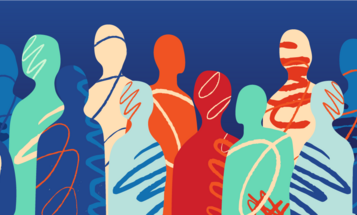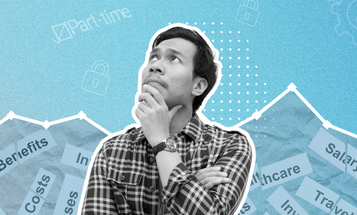
Markets Don't Stop Racism But They Can Perpetuate It
Frankly, some people benefit economically from exploiting racial discrimination—for example shareholders in the companies that profit from discriminatory hiring, pay, and promotions policies, or say, the Corrections Corporation of America.
There are structural and often subconscious incentives to discriminate when an in-group benefits from social exclusion, like how light-skinned people in particular are more prone to racial distinctions when they perceive economic scarcity. That means that recessions both intensify the perception of disparity and reinforce disparate outcomes as (often subconscious) interpersonal prejudice and (unacknowledged) institutional racism combine.
But there does not have to be a racist actor or a recession in order for markets to perpetuate racism and racial inequity.
Racial disparities in labor markets, wealth accumulation, and economic mobility persist even in the best economies as the legacy of past discrimination disadvantages people of color in transactions with ostensibly race-neutral rules. In just one example (there are plenty), economists found that residential segregation by race and income is the number one factor correlated with intergenerational income mobility. Before a person even enters the labor market, her earnings potential is linked to the conditions of her birth: the demographics of her neighborhood, its proximity to markets, the quality of its schools, the economic networks with which it connects, or doesn’t.
In St. Louis, a child born into a family with earnings in the bottom quartile has a 5.1 percent chance of making it to the top, ranking the city 82nd out of the 100 largest US cities ordered according to these odds. As has been widely reported, over the past decade—and especially since the recession - the St. Louis suburb of Ferguson has been downwardly mobile. Predatory lending with explicit racial targeting hit predominantly Black communities like Ferguson hard, as did the greater likelihood of displacement for Black workers when financial markets froze, businesses scaled back, and the labor market turned sour.
A growing chorus of organizations and scholars, including Demos, but also radicals like Standard & Poor’s and the IMF, identify the persistence of institutionally embedded inequality as a critical obstacle to real democracy, social and political stability, and economic growth. Acknowledging and addressing the racial dimensions of that inequality are increasingly urgent responsibilities for our country as demographics shift toward a growing population composed of the people who are left out of power structures, failed by systems of justice, punished for their skin tone in economic markets, and as a result more likely to be disaffected by and disillusioned with institutions as they stand.
The classically oblivious treatment of racism as an inefficiency that will be eroded in markets by the pursuit of profits has failed to produce results. Not only is racial equity not progressing, it is worsening. Employment and income gaps today are roughly equal to the levels of the Civil Rights Era and wealth inequality is at historic highs. Moreover, Black workers have already adopted the conventional market-oriented prescription to boost education and human capital, more than doubling educational attainment since 1980, but that failed to produce returns.
People whose interactions with institutions of power—including those in politics, law enforcement, and the economy—are generally innocuous have a hard time identifying with the frustrations raised by groups with a different experience.
Sorry, but we don’t have time for that. Our best hopes for America reside in our ability provide the opportunity for every citizen to thrive. That promise cannot be realized without recognizing that we are culpable for an economy that reproduces racism and that it is both our duty and our interest to fix it.



